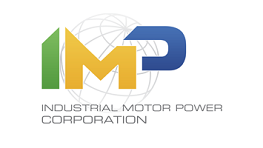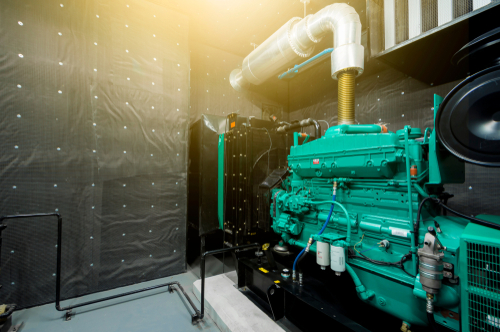Powercut!
That is the last thing you want to hear in the middle of production, and yet it can happen. If you operate a company, you know how crippling it can be to profits to have a sudden break in production.
To allay these concerns you need to create a plan to help you function in the event of unforeseen circumstances and power outages. The best step you can take to specifically address emergency power is to invest in a commercial generator that will keep your lights on and the company running when the grid goes down.
The time that is spent without electricity can be a great loss for any company. However, it¬†can be especially disastrous for companies where reliable power is mission critical; restaurants can lose hundred of thousands of dollars in perishable inventory, cold storage facilities can be liable for damages to their clients’ losses, manufacturers, drillers, mining & aggregate companies can lose days or weeks of productivity. To avoid this, you should consider a permanent backup generator for your business.
To help you make the best decision, here are some helpful questions to ask your commercial generator company.
1. What is the Power Usage of the Commercial Generator?
The first thing you want to determine is how many watts is efficient to keep your business running. If you operate a small business then¬†you’re likely only needing to keep office lights, servers, computers and printers up and running– a relatively low power load.¬† In contrast, a large manufacturing plant has to power all of the above in addition to larger production machinery which will demand much higher KW.
One way to know the amount of wattage you’ll need is to assess your electricity bill. Look at it your power usage over the past year to determine your daily needs, and this will help narrow the field of generators that will be appropriate to your business.¬† Typically, monthly power bills will outline your business’s peak usage — a good indicator of your requirements.¬† To ensure you have enough reserve power, it’s advisable to ad 25% above your peak usage when calculating your overall backup KW needs.
Regardless, while the above advice will point you in the right direction, you will still want to have a professional generator dealer evaluate and advise you before purchase.
2. What are the Types of Fuel?
The amount of wattage you use is an effective way to determine the type of generator you will need. However, you should also be aware that the electricity that the generator will produce is¬†dependent on the engine.¬† With that, you will need to think about the fuel that the generator will use as well. There are several types of fuels available, however both your power usage, the frequency with which you will need to use your generator, and whether or not the fuel will be stored on site need to all be taken into consideration. For example, if you’re looking, if you’re power requirements are in excess of 100KW and you will be storing fuel on site, then diesel is likely ideal.
Let’s take a closer look:
Natural Gas
If your business has a natural gas line, then this fuel type may be best¬†suited for you. It saves you the cost of storing fuel on your property and is always available for usage. It remains functional even when it’s cold, and while these engines consume more quantity of fuel,¬†operation is very cheap and convenient.
Diesel
This fuel type is the most popular among commercial generator fuels. It is very convenient and it runs efficiently. This fuel is also one of the most affordable types to both operate and maintain. It works well when the weather gets cold and can be stored on-site for up to two years.
Dual Fuel
Did you know there are engines that can run on both diesel and natural gas?  Well, these engines are especially well suited for businesses operating generators for prime power, while their versatility ensures that regardless of what fuel you have immediately available, your operations stay up and running.
Gasoline and Propane
For small businesses with low power needs, these can be viable options.  However, at scale, both of these fuel types can be quite expensive and for different reasons.  Propane can be stored indefinitely, but carries a high price tag; gasoline may be cheaper, but only has a one-year shelf life.
3. What is Running Time Like?
The next factor to consider is the period of time that you will need the generator to power your business. You will not know how long a power outage might last so to anticipate the time period will be a bit difficult.
Despite that, you still want to purchase a generator that will run indefinitely since it will be the main source of power. The running time goes hand-in-hand with the fuel type so it is always important that you get the most efficient fuel for your business.
Whether it is a small business or a manufacturing company, you want to ensure that the fuel is able to support your generator for a lengthy period. Once the fuel runs out, your generator will stop running so consider the fuel source at all times.
4. Is the Generator Stationary or Portable?
An important question to ask about your commercial generator is its mobility. Depending on the type of business you run you may or may not need a stationary generator.
A stationary generator connects to your electricity line and monitors your electricity. Should there be a power outage, the generator will automatically switch on to supply your business with electricity. This is especially useful if your business sells or manufactures frozen or perishable goods.
In this case, you would never want to be without a way to get power fast. A stationary generator will also ensure that your security lights stay on should a power cut happen at night.
Portable generators are very useful as well and tend to be more affordable. If you wish to perform renovations on your business and will need to disconnect the power supply this is a great option.
These are also great if your business is located in an area that is prone to hurricanes. Good models to try are the CAT XQ500 or XQ1000.
These generators are a good choice if you have an office and want to ensure that your computers will still run and your security systems will still be powered if there is a power outage.
Both portable and stationary generators help to boost safety and security when the power goes out. For example, if you have an office that is dark and usually needs lights during the day, a portable generator can help to prevent accidents.
5. Is the Generator Cost Friendly?
Your generator should be able to fit within your budget. However, do consider that sometimes even when the cost is cheaper you are not necessarily getting a good deal. This is because you have to consider the cost of maintenance that will come sooner or later.
Commercial generators usually require frequent maintenance, servicing, and testing to ensure that they are running efficiently and effectively. This sometimes can become very costly for you, so factor this into your budget.
One additional factor to consider is the fuel cost which usually fluctuates so it is difficult to determine what the price will be. However, when choosing a generator try to project future fuel costs and let it be a guiding force in your choice of generator.
Choosing a Generator
All businesses require equipment that will allow it to function in the event of an emergency. As long as you operate a business, you must consider all options to save you time and money. Invest in a commercial generator that is most suitable for your business and be sure to consider all the factors discussed here.
If you run a large business you want to ensure that your generator can operate efficiently with the right fuel and is connected to your utility line. If you run a small business you can get away with using a small portable generator.
If you would like some help with selecting the most efficient commercial generator for your business, contact us today. We can help you find the best generator for your needs.









